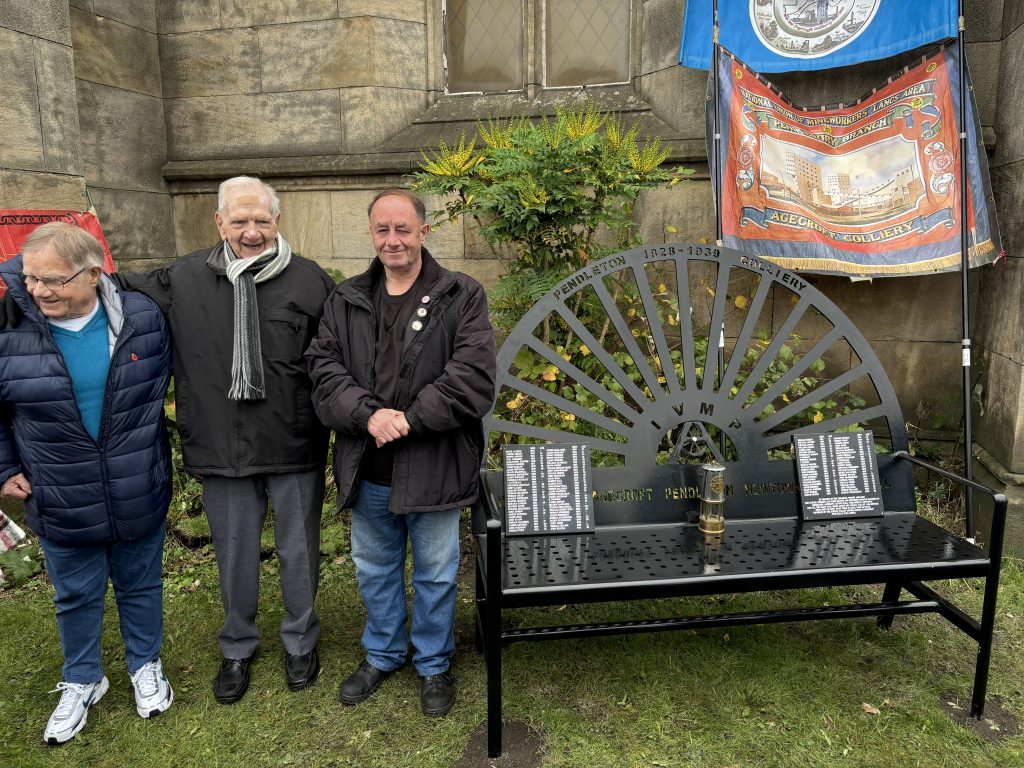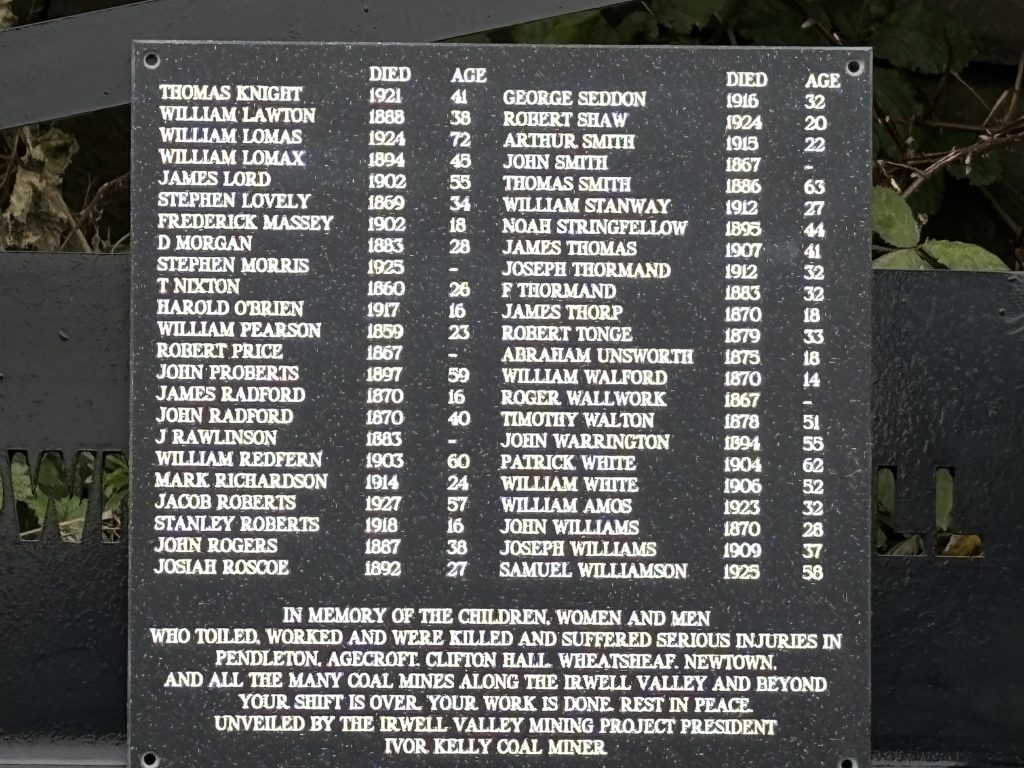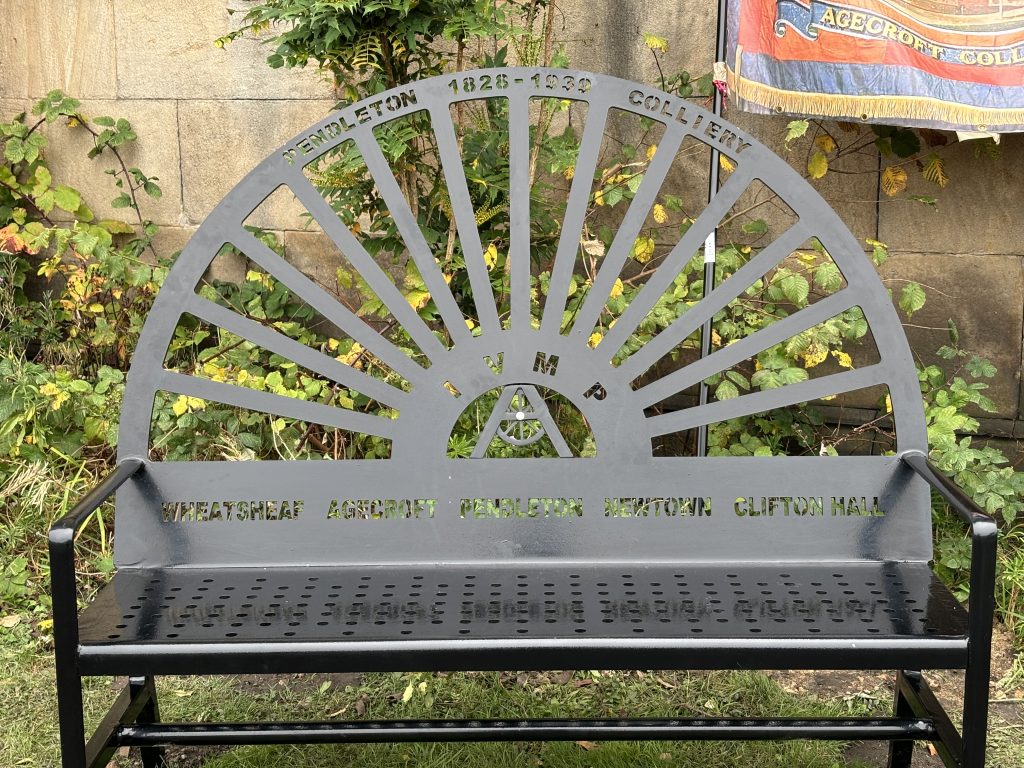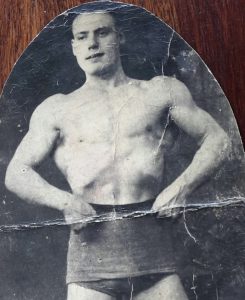
A memorial bench dedicated to workers who died in a Salford mine has been erected in the borough.
Crowds gathered in the grounds of St. Thomas’ Church on Saturday (November 2) to pay tribute to those who worked at Pendleton Colliery during the 19th and 20th centuries.
Alongside the bench are two memorial plaques that include the names of those who died in the pit,. Many former Salford coal miners attended to remember their peers for their efforts in the mines.
The Pendleton Colliery existed between 1828 and 1939, with the areas of the pits visible from the church grounds.
It has a strong history, with the Colliery disaster in 1925 reaching a 100th anniversary next year. Eight died as part of the disaster, as a result of a floor heave, which happens when the weight on a floor gets too much. Back in 1870, the pit also exploded causing the death of nine men and boys.
The bench was unveiled by Paul Kelly, former miner and secretary of the Irwell Valley Mining Project (IVMP) with two former miners of Agecroft Colliery, following the blessing of Bishop Frank.
After a passionate speech, Paul expressed how much work and time had gone into the memorial bench.
Paul said: “It is insurmountable the amount of work that goes into things like this. We come today, and it is just unveiled and you think it is just there, but you have to have a lot of meetings, contract the work out, find someone to do it, get permissions. We had to wait 18 months for the church to give us authorisation, so that took quite a long time.
“The bench had actually been built about a year, and has been in storage in the church until we had permission to put the bench into the ground. There is a lot of work behind the scenes,” Paul added.
However, the IVMP’s ambition to have memorials for the five significant Collieries in Salford means that work does not stop; they want all miners who died in Salford to be remembered.
Paul said: “We’ve done three monuments now in Salford, and are planning to do five. We are going to do something for Wheatsheaf and Newtown, they will be the next part of the project. We are raising funds for a banner for Pendleton Colliery, and that will cost about £1000. We’re going to have a fundraiser at St. Thomas’ Church in the near future.
“The Pendleton miners are long gone. The people here are Salford descendants, they are great grandfathers or great uncles, and there is a connection. They built this city, they gave their lives and their blood, their health and we should remember that.”

Paul worked in the Agecroft pit during the 1980s, which has a plaque and garden in tribute. The memorial is situated in the former pit entrance and has the names of the 93 people who died in the colliery.
Pride was the overjoying feeling following the resurrection of the bench, as Paul wishes to shed light on the importance the industry had on Salford.
He explained: “It has been 85 years since the pit shut near enough, and I am proud of the achievement of recognising those people,” Paul commented. “It recognises the sacrifice and fantastic work they did for our community, and that made us who we are today.
“I am one of the last miners, I am 65. You get a lot of injuries in the pit, you get arthritis, and my knees are gone. For me, it was a worthwhile job and I really enjoyed it. It is so beneficial to the community. It is not like it is today, coal was used to power people’s needs.”

The bench has created a restart of conversations between former miners and those who had family members involved in the pits until its closure in 1939.
Pat Singleton, 81, spoke about her father-in-law and his brother, who was the last person to be killed in the pits.
“My father-in-law used to talk endlessly about the pit because it was so special to him,” Pat said.
“You could visualise it, talking about the men who worked down there, it was so hot and wet. They used to wear their wives’ underwear, and some of the men worked naked.”

Despite the tricky conditions, Pat said that during conversations about that era, it was a glorified time for those who worked in the mines.
“When he talked about it he said, although the conditions were horrific and the seam in places was only 18 inches high, the sense of friendship and support amongst the men was like a bond that would never break; they were brothers,” Pat added.
When talking about Bob Singleton, who was her father-in-law’s brother, Pat described the time when he died.
“It was the 31st of January, 1939, one of the props had a problem and it collapsed, and Robert Singleton was killed,” said Pat. “My father-in-law was with him at the time, and he talked about the four men putting him on a flatbed and putting him on the bottom of the pit. He hadn’t been allowed to go with him because he was so devastated.
“He went home and told his father what happened and the heartbreak of it all. It was very vivid, and never really left him. The pit closed in April of the same year which he died.
“It’s very important [to pay tribute], it is part of the fabric of Pendleton and Salford. I would really like if these people are remembered – that generation was a special generation.”
The Irwell Valley Mining Project is already looking forward to the next memorial, but the funding is an issue that slows and prevents the process from happening faster.
The next planned memorial is at Wheatsheaf Colliery in Pendlebury, which employed more than 650 workers between 1846 and 1961.
Paul said: “We will look at Wheatsheaf when we have the money, we’re all volunteers, and we haven’t got the money unfortunately otherwise we would do a lot more.”
“Once we have Wheatsheaf and Newtown then we would have done the five major pits in the lifetime of Salford. It’s taken 13 years to get three monuments, so the quicker the better in order to get this done. We want to do it for the remembrance of the miners, the love of the community and the love of Salford.”
Paul hopes that the work of the IVMP will leave a positive reflection on the city while reflecting on a time when the sense of community is larger.
He said: “Apart from the murder and mayhem and all the horrible things that seem to come out of Salford, this is something we are really proud of and should be celebrating.
“I am proud of the achievements we have made for others, not simply for myself and my father but for everyone who worked in the mining industry – they all deserve recognition for making this country what it was,”
“They did it for the community, for humanity, that is why I respect it more than anything. They didn’t do it for money, they didn’t do it for greed, it was more than a job and it was a community of looking after together – that is what we should be doing in society today.”















Recent Comments